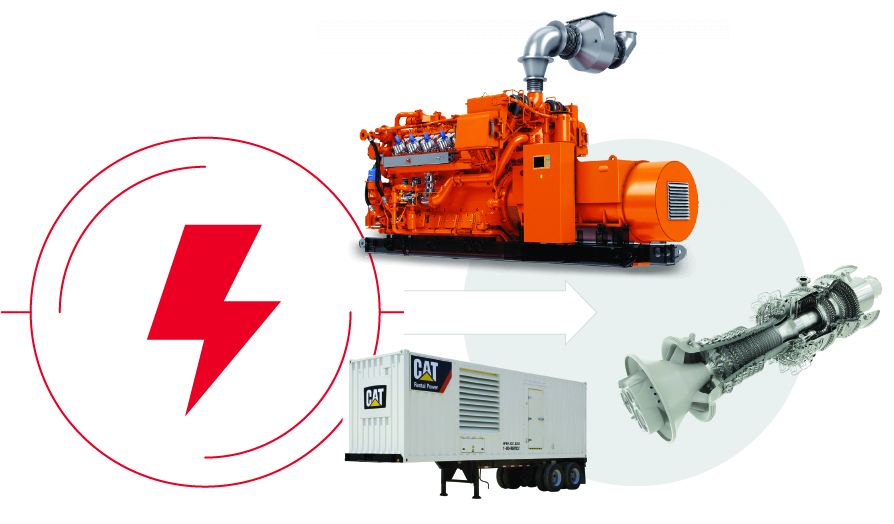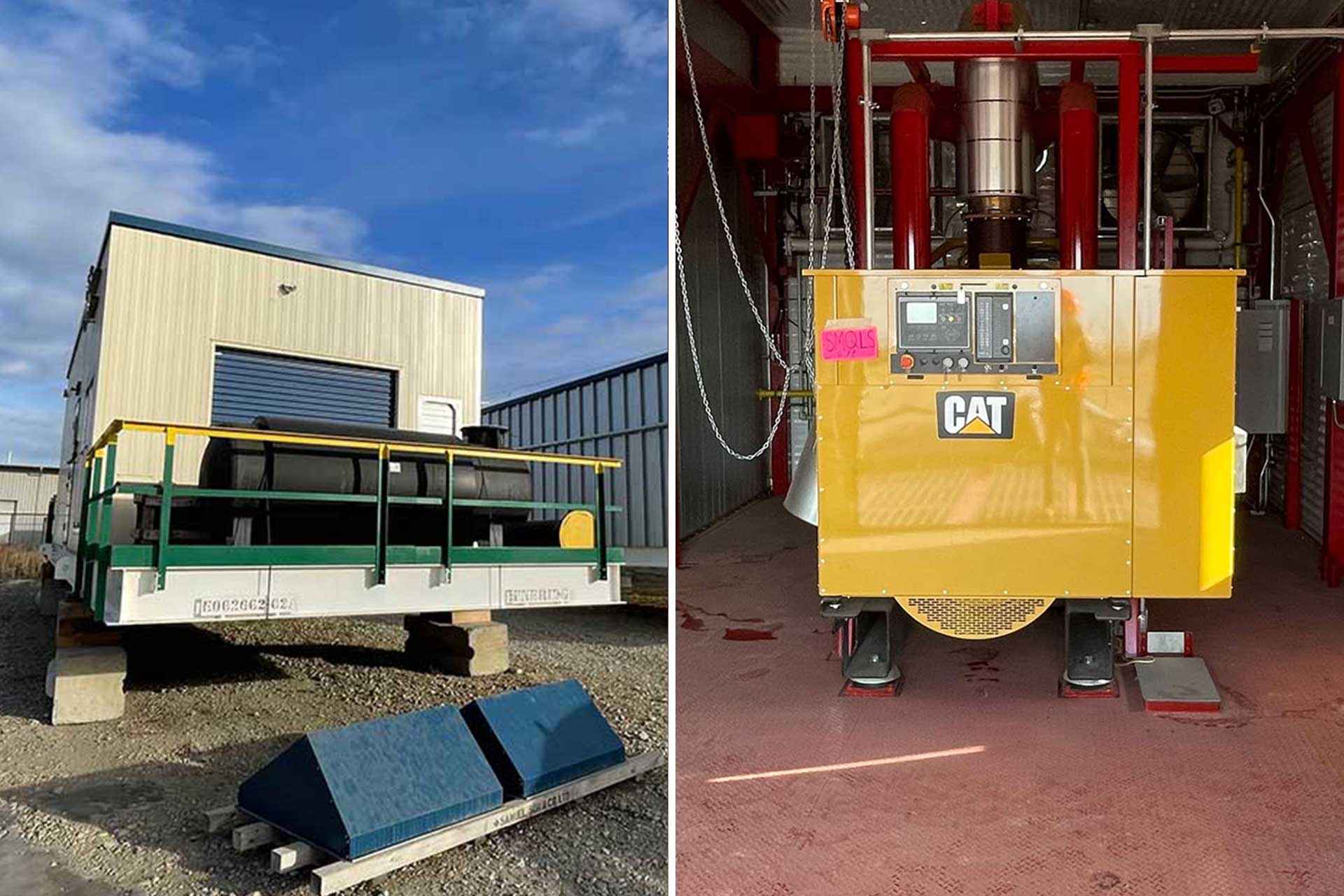Looking for a for sale used, new, or surplus diesel or natural gas generator? Whether you are seasoned power generation expert, or simply growing in your knowledge on industrial grade generators, there are some core generator criteria to help guide you in finding a genset to fit your power requirements and preferences. This Basic Guide to Selecting a Generator is simple walkthrough of these considerations to fit an appropriate heavy-duty generator to your power generation needs in Canada, the US, or internationally.
While the specifics of some of these elements may be non-negotiable for you, be considerate of which can be flexible (i.e. voltage being handled by transformers vs. your generator/alternator end only) so that you may maximize the the number of possible solutions that can still solve your overall power need.
How to Choose a Natural Gas / Diesel Generator
Download a PDF version of Basic Guide to Selecting an Industrial Generator here.
Illustrated in the graphic above, these criteria are consistently part of conversations we have with buyers and end-users of new, used, and surplus gensets and prove to be useful in matching unique power generation needs to the best solutions. Have a look below and let us know if we can further assist you with selecting and procuring a generator solution for you.
Generator Equipment Lifecycle at Glance
Generally there is a basic arc of any generators
- Selection and the purchasing your genset along with any auxiliary equipment.
- Transportation and delivery of your generation equipment/plant to site.
- Install of your generator – which may include planning, engineering, regulatory approvals (emissions, environmental and others), construction and installation of your power generation equipment.
- Start-up/commissioning of your power generation plant if stationary.
- Plus, ongoing Operations and Maintenance of your generator throughout its use. This may include regular monitoring, service, and generator overhauls.
While Crusader is primarily involved in step #1 of the above list, we assist on an instance by instance basis with consulting customer needs and making recommendations provided by 3rd party power generation service companies and providers.

A Basic Procurement Guide to Finding the Right Diesel and Natural Gas Generator
- What total kW or MW output do you require? – It’s critical to determine what kilowatts / megawatts you require and may anticipate. Also knowing if there’s a flexible range that you might want to have for your varying load, or perhaps you might know exactly how much you will require, all the time. Further, you may have a preference for how much load you want distributed across multiple generators, or if you want everything handled by one primary generator unit.
- What is your fuel type/source for your power generation? Is your generator going to be fuelled by natural gas, diesel, or multiple fuel sources via a dual-fuel, or tri-fuel systems? Each has their own consideration for economics, maintenance, and more.
- What do you want as generator’s prime mover? Unless your generation motion is powered by hydro or wind, your driver that propels the generator/alternator end will typically either be a reciprocating engine or a gas turbine. Each has their own features, benefits, and considerations.
- What voltage does your power need to Be? What voltage do you require? 13.8kV? 480V? 400V? These voltages are specifications of the alternator/generator end, and if your power requirement doesn’t match the generator voltage, you can achieve your desired voltage alternatively through transformation.
- What generator rating do you require? Do you require standby power, prime power, or continuous? Some generators while rated for one, can be derated to a different power output rating, however some generator systems are suited for only one type of duty rating.
- Generator frequency (Hz) for Your Location? Know where the geographic install location and the respective frequency required for that locale. Some generators can be conveniently switched between 50 Hz and 60Hz, while others require alterations to swap between frequencies.
- What’s your budget for purchasing generators? We all know that there are limits to scope and supply depending on budget amount. Want a lot of features and don’t have a large budget? Perhaps a used generator with some working hours on it would be best suited for your project. Want the peace of mind of that comes with buying new, a surplus never-used genset? Well, then buying brand new with warranty may be the best route. Be mindful of what elements are non-negotiable so that you can acquire the most value for what you are prepared to invest.
- What genset condition is acceptable to you? Are you looking for generators that are used, used with lots of hours, used with minor or major repairs required, used with 0-hour overhauls, brand new, or older models that are never-used – as you can see there are many types of condition in which you can purchase a generator, all with corresponding economic and ownership considerations of each.
- What generator manufacturer, and/or model do you prefer? There are a number reasons to go with any one particular manufacturer. Some generator operators are insistent with going with one make and equally with not going with another. Or perhaps you are indifferent all together. Major brands in the reciprocating and turbine generator space include: Caterpillar generators, MTU Rolls-Royce generators, Cummins generators, Kohler generators, Innio Jenbacher and Waukesha generators, GE General Electric generators, Seimens generators, John Deere driven generators, Wartsila generators, Solar Turbines generators, and many more. All brands include a number series and variations of generator models to suit a diverse range of power applications.
- Will you be operating your generator on an open-skid or does it need to be enclosed? While some climates and install locations can utilize an open-skid design for your generator, some require covering whether that be a simple canopy, a drop over enclosure, or a sophisticated skid mounted building complete with all conveniences for the operator and ongoing maintenance.
- EXTRAS… over and above the baseline power requirement, what features are important to you? Power generation setups range from bare-bones utility, to sophisticated state-of-the art systems that include such features as cellular connectivity for monitoring and equipment control. Are there residents within 50 meters of your plant and you needing to have sound within a strict dBA value? There’s sound attenuation solutions for situations like that. Is your region tightening up their emission rules to unprecedented levels? There are emission control systems to suit. Whatever your requirement, there is likely a solution to be realized with the right partners and adequate resources.
- To warranty, or not to warranty? While used most used equipment available in as-is condition, purchasing brand new offers varying levels of warranty depending on the conditions offered by the OEM and/or seller. Older units that are never-used can sometimes be warrantied under conditional inspection from a power generation provider/OEM, however there’s often a premium to obtain this assurance that goes along with this peace of mind. Additionally, sometimes sellers offer warranty on used generators that have received 0-hour overhauls to give buyers confidence with their purchase of a used generator.
- How many generators do you require? Depending on the number of generators you require delivery time can be affected due to current availability. Additionally, volume discounts can be realized on volume purchases.
- Where is your power generation install location? Location has a number of cascading affects on your procurement process including: delivery time and delivery costs, service providers ability to conveniently service your generator, what regulatory considerations you may have in operating power generation equipment, and many more considerations. Be mindful the specifics relative to your install location when planning for, and purchasing your generators.
- When do you need your genset(s) delivered? Is your project behind schedule and did you need you generators yesterday? Are you looking to get moving fast, however in due time. Or is your project a ways out now, or are you in the evaluation stages of a venture? All of these different scenarios have bearing on what can be delivered, and whether in a timeframe that matches your needs. Industrial grade power generation are high-value items and surplus inventory is typically less abundant compared to lower price-point goods. If your project demands urgency for generator delivery, be mindful of what criteria can be flexible so that you can better achieve expediency.

Related: For Sale Never-used 1MW 1000kW Caterpillar G3512 Natural Gas Generator in Illinois, Midwestern USA
Are You Requiring Diesel or Natural Gas Power Generation Equipment?
Looking for a new, used, or surplus generator for your power project? Contact us to discuss what you’re looking for, or view some of our industrial grade generators.
